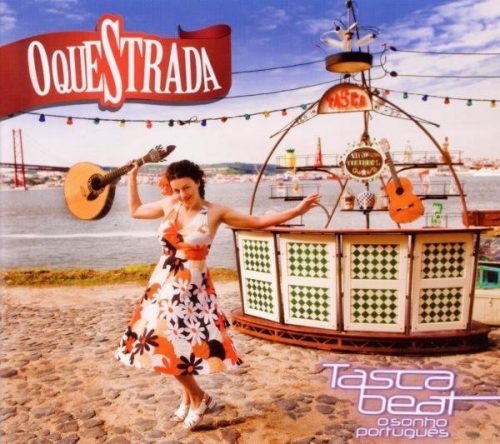The band was born from the desire of Marta Miranda and Jean Marc Pablo – both coming from the world of entertainment, she as a theatre actress with experience in the hidden Fado houses and Cape Verdean taverns, where she began to sing, he coming from France with a suitcase full of experience in urban intervention and show design– to create a portable musical project with the shape of a small neighborhood orchestra ready to travel, where the personality and uniqueness of each individual is the main idea. Only when joined by João Lima and his Portuguese guitar the band could finally start searching for its style and sound. First came the name. OqueStrada is a portmanteau word coming from the juxtaposition between „orquestra“ (orchestra) and „estrada“ (road).
At first, OqueStrada set its base at an old cinema in the city of Almada, a lookout for Lisbon on the other side of river Tagus. In this suburban reality, they tackled destiny and hit the road, building, year after year, their own circuit. They left in search of a country and went on building a cult, a well-kept secret for many. Their simple music grew on this adventure between small village fairs, “tascas”, festivals and city venues. They have released their debut album in 2009, in Portugal. After signing with JARO Medien, the band could share its Portuguese suburban sound with audiences throughout the whole Europe.
Style
OqueStrada renews and changes the traditions of Portuguese music. Sometimes one becomes a prophet in one’s own land. For seven years, OqueStrada played the clubs of Portugal with its crispy-fresh cosmopolitan swing. The group created its own genre– ‘Tasca Beat’. Tasca represents a Portuguese tavern, a tiny establishment where people hang out, eat and drink cheaply. Many years ago, it was the venue for the rawer and most popular forms of Fado and Portuguese urban culture (forms at risk of becoming extinct). Thus, in OqueStrada’s ‘Tasca Beat’, one could see a corner-café groove immersed in a Portuguese blend of joie de vivre with a pinch of nostalgia, a package full of Portugal, a sound that winks at Fado and listens to the forgotten secrets, a proletarian passion from the streets of Lisbon and the suburban neighborhoods. The band’s style reflects the music of a harbor where many languages are heard and blend with the dream of departing, only to later return. In this sense, Disco Digital Magazine characterized the style of the as: „[…] a popular neighborhood song based on the stylistic richness that goes from Fado to popular music, passing through some Balkan references (which in OqueStrada’s vision come from some Portuguese tradition). Always with lots of humor in the mix. In a perfect world, ‘Tasca Beat’ won’t be classified as world music because this term reduces the music that celebrates the artistic liberty that goes far away from the borders of the song. “
Performance
Since 2001, Oquestrada has been absorbing the essence of the land into its music and concerts. Over these years, OqueStrada established a public of its own, until wherever they played, the auditorium was sold out. When talking about its live performance, Raymond Soltysek (writer and collaborator to BBC Radio) mentioned: ”They are brilliant. It is incredible fun. Miranda plays the crowd with crazy dances and glimpses of big knickers, and she is wonderfully charismatic. The band members are adept at having those intricate conversations between individual musicians, most especially a hot and intense accordion player and an utterly wonderful Portuguese guitar player who does mind-boggling things with his left hand […]”
“One of the most original projects recently arrived from Portugal” Le Monde
“OqueStrada is an antidote to Portuguese fatalism.” Mary Ann Kennedy (BBC Radio)
“Their surreal sonic bouillabaisse is something absolutely unique. […] Like a philharmonic band on acid, they dream up the precise thing the person who coined the term “world music” was thinking about.” João Lisboa, (Expresso)
”We are so much used to the melancholy of the national music from Portugal that we did not expect such a music full of joie de vivre from this corner of Europe. But, OqueStrada wash away the cliche about Fado.“ FOLKER
“[…] all together forms OqueStrada a bracing mix of cheerfulness, melancholy, desire and daydreams: Exactly the right formula against the appearing cold at the end of the show in Wenkenpark.” Badische Zeitung
“[…] one of the best and most imaginative Portuguese projects since ages: the fado as the base idea but hundreds of other styles more (…) always with delicious lyrics, pose and detours.” António Pires, (Time Out)
”They are brilliant. It is incredible fun. Miranda plays the crowd with crazy dances and glimpses of big knickers, and she is wonderfully charismatic. The band members are adept at having those intricate conversations between individual musicians, most especially a hot and intense accordion player and an utterly wonderful Portuguese guitar player who does mind-boggling things with his left hand […]” Raymond Soltysek (BBC Radio)
Oquestrada’s new album : AtlanticBeat – “Mad’in Portugal”
CD Release Date: 26th September 2014 – (JARO 4321-2)

Here OqueStrada’s old motto, “leave to return” is stronger than ever. Between the strength of the Atlantic beat and the weight of old Europe, between what we are and what we may come to be, Atlantic Beat Mad’in Portugal launches a concept of a dancing song, hand-embroidered acoustic dancing music.
In this 2nd album of originals, Joao Lima, Pablo and Marta Miranda found a sound focused on the melodic line of the voice and rhythm of the words, in the harmonies and rhythms of the Portuguese guitar and in the beat of the washtub bass and the deep-voiced bombo drum. This filigree beat is designed using Fado instruments played by those who do not come from the world of Fado, but rather from the bands’ meanderings around the planet over the past twelf years. They brought together various brilliant classical and pop musicians: André Bahia on guitar, Brazilian Moisés Fernandes with his silvery trumpet, whose music matured in Lisbon’s nights, and the authentic jewels of Portuguese accordion player Marina Henriques and Nelson Almeida. In the studio they were joined by accomplices Sérgio Costa and Nuno Rebocho.
Glossar:
OqueStrada – Orchestrate the road, the pathways, Orchestrate your destiny…A pocket orchestra ready to travel!
Atlantic – Ocean that units Europe, Africa and America shaped like the letter S. It’s name comes from Atlas, a divinity of Greek mythology, the first king of mystical Atlantis. A spirit of Atlantis is said of someone of extraordinary strength, Herculean, (such persons are threatened with extinction).
Beat – Rhythmic pulse; beat or bar ( either musical, cardiac or maritime).
AtlanticBeat – A new Atlantic beat with a Portuguese-speaking heart, favouring the encounter and disconnect with the world (undergoing expansion).
AtlanticBeateiro – A person of faith, sea salt and lots of Atlantic vibe.
Mad’In Portugal – The madness of a country trying to find itself…
Line-up of the Live- Performance:
Marta Miranda………………………………voice
Pablo……………………………………………wash tube-bass
João Lima……………………………………..portuguese guitar
André Bahia…………………………………. guitar
Marina Henriques/Nelson Almeida…..accordion
Moisés Fernandes…………………………. trumpet
Marta Miranda– voice

Jean Marc Pablo– contrabass

João Lima– Portuguese guitar

André Bahia – acoustic Guitar
Moisés Duarte– trumpet
Marina Henriques or Nelson Almeida– accordion


